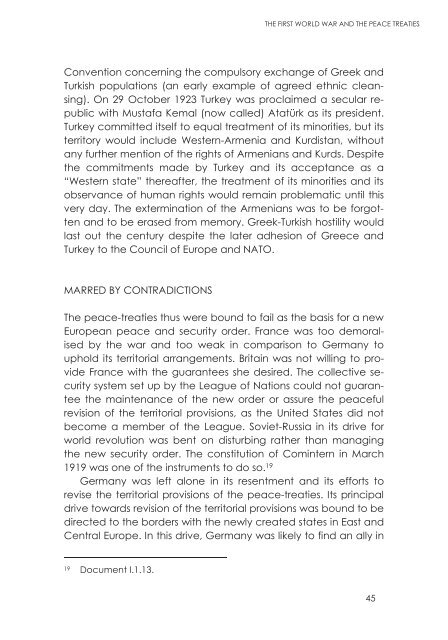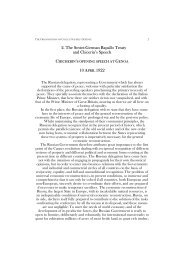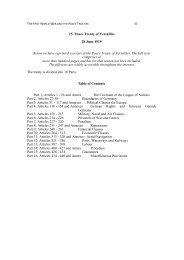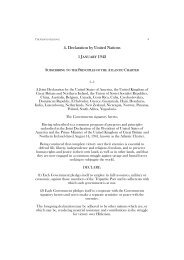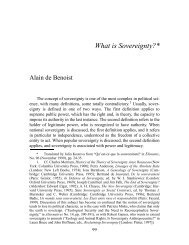CHAPTER 1 THE FIRST WORLD WAR AND THE PEACE TREATIES
CHAPTER 1 THE FIRST WORLD WAR AND THE PEACE TREATIES
CHAPTER 1 THE FIRST WORLD WAR AND THE PEACE TREATIES
You also want an ePaper? Increase the reach of your titles
YUMPU automatically turns print PDFs into web optimized ePapers that Google loves.
<strong>THE</strong> <strong>FIRST</strong> <strong>WORLD</strong> <strong>WAR</strong> <strong>AND</strong> <strong>THE</strong> <strong>PEACE</strong> <strong>TREATIES</strong><br />
Convention concerning the compulsory exchange of Greek and<br />
Turkish populations (an early example of agreed ethnic cleansing).<br />
On 29 October 1923 Turkey was proclaimed a secular republic<br />
with Mustafa Kemal (now called) Atatürk as its president.<br />
Turkey committed itself to equal treatment of its minorities, but its<br />
territory would include Western-Armenia and Kurdistan, without<br />
any further mention of the rights of Armenians and Kurds. Despite<br />
the commitments made by Turkey and its acceptance as a<br />
“Western state” thereafter, the treatment of its minorities and its<br />
observance of human rights would remain problematic until this<br />
very day. The extermination of the Armenians was to be forgotten<br />
and to be erased from memory. Greek-Turkish hostility would<br />
last out the century despite the later adhesion of Greece and<br />
Turkey to the Council of Europe and NATO.<br />
MARRED BY CONTRADICTIONS<br />
The peace-treaties thus were bound to fail as the basis for a new<br />
European peace and security order. France was too demoralised<br />
by the war and too weak in comparison to Germany to<br />
uphold its territorial arrangements. Britain was not willing to provide<br />
France with the guarantees she desired. The collective security<br />
system set up by the League of Nations could not guarantee<br />
the maintenance of the new order or assure the peaceful<br />
revision of the territorial provisions, as the United States did not<br />
become a member of the League. Soviet-Russia in its drive for<br />
world revolution was bent on disturbing rather than managing<br />
the new security order. The constitution of Comintern in March<br />
1919 was one of the instruments to do so. 19<br />
Germany was left alone in its resentment and its efforts to<br />
revise the territorial provisions of the peace-treaties. Its principal<br />
drive towards revision of the territorial provisions was bound to be<br />
directed to the borders with the newly created states in East and<br />
Central Europe. In this drive, Germany was likely to find an ally in<br />
19 Document I.1.13.<br />
45


